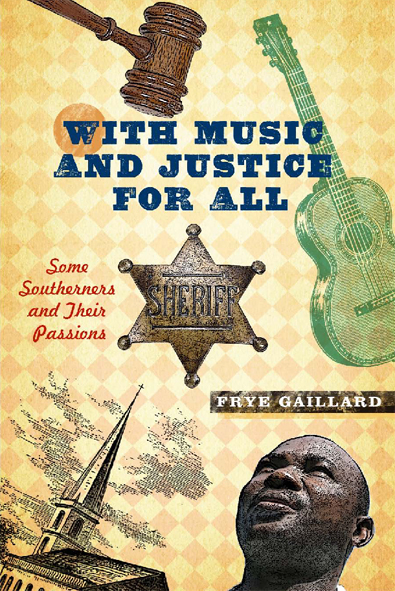















Southern Press
A Review of
With Music and Justice for All
Some Southerners and Their Passions
(Frye Gaillard; Nashville: Vanderbilt University Press, 2008.)
With Music and Justice for All
Some Southerners and Their Passions
(Frye Gaillard; Nashville: Vanderbilt University Press, 2008.)
Once again, University of South Alabama Writer-in-Residence Frye Gaillard (b. 1946) has added another exemplary body of work to his long list of distinguished books. Describing With Music and Justice for All: Some Southerners and Their Passions in the preface as "a collection of work that I have done over thirty-five years," Gaillard writes, "During that time, I have been lucky enough to write about the South---a combination of journalism and memoir, with a dash of history thrown in here and there."
Born and reared in Mobile, Gaillard cut his teeth in journalism, eventually becoming the Southern Editor at the Charlotte Observer. He was also the founding editor of Novello Festival Press, the nation's only public library-sponsored literary publisher. A prolific author, Gaillard has written numerous books, including Prophet from Plains: Jimmy Carter and His Legacy; Race, Rock & Religion; The Dream Long Deferred: The Landmark Struggle for Desegregation in Charlotte, North Carolina; Watermelon Wine: The Spirit of Country Music; If I Were a Carpenter: Twenty Years of Habitat for Humanity; and Cradle of Freedom: Alabama and the Movement that Changed America (the winner of the 2005 Lillian Smith Award).
Drawing from his wealth of journalistic insight and experience, Gaillard has assembled a collection of his own writing "from the realms of religion, music, civil rights and social change," to produce With Music and Justice for All. He declares, "I continue to believe that the larger-than-life figures of our age---from Johnny Cash to Jimmy Carter, Billy Graham to the leaders of the civil rights movement; even John T. Scopes, whom I met briefly in 1970---put a revealing face on the era we have lived through."
Born and reared in Mobile, Gaillard cut his teeth in journalism, eventually becoming the Southern Editor at the Charlotte Observer. He was also the founding editor of Novello Festival Press, the nation's only public library-sponsored literary publisher. A prolific author, Gaillard has written numerous books, including Prophet from Plains: Jimmy Carter and His Legacy; Race, Rock & Religion; The Dream Long Deferred: The Landmark Struggle for Desegregation in Charlotte, North Carolina; Watermelon Wine: The Spirit of Country Music; If I Were a Carpenter: Twenty Years of Habitat for Humanity; and Cradle of Freedom: Alabama and the Movement that Changed America (the winner of the 2005 Lillian Smith Award).
Drawing from his wealth of journalistic insight and experience, Gaillard has assembled a collection of his own writing "from the realms of religion, music, civil rights and social change," to produce With Music and Justice for All. He declares, "I continue to believe that the larger-than-life figures of our age---from Johnny Cash to Jimmy Carter, Billy Graham to the leaders of the civil rights movement; even John T. Scopes, whom I met briefly in 1970---put a revealing face on the era we have lived through."
On the subject of civil rights, in one chapter Gaillard explores the audacious resolve and the pioneering efforts of the Greensboro Four, who staged the first lunch counter sit-in on February 1, 1960. In another story, he examines the journey of college basketball star Perry Wallace, a high school valedictorian and the first black player in the Southeastern Conference (SEC), and the various precedents he set while attending Nashville's Vanderbilt University in the late 1960s. And he shares the intriguing journey of Thomas Gilmore, the first black sheriff of Greene County, Alabama, and the unique dilemma he faced once elected.
In addition to the people and events of the civil rights movement, Gaillard focuses on politics and religion. He asks some tough questions of Dr. Billy Graham and his legacy. Graham had once held President Richard Nixon in high esteem and gladly echoed the pervading rhetoric of his White House allies at the height of the Cold War, only to eventually "see the humanity of America's adversaries" and feel a greater burden for those affected by poverty, racism, social injustice and war. Referring to Graham's crusades, Gaillard wonders if the Charlotte native demanded enough of the people, asking, "Did he encourage the millions who answered his call to live on the hardest edge of their faith?"
In addition to the people and events of the civil rights movement, Gaillard focuses on politics and religion. He asks some tough questions of Dr. Billy Graham and his legacy. Graham had once held President Richard Nixon in high esteem and gladly echoed the pervading rhetoric of his White House allies at the height of the Cold War, only to eventually "see the humanity of America's adversaries" and feel a greater burden for those affected by poverty, racism, social injustice and war. Referring to Graham's crusades, Gaillard wonders if the Charlotte native demanded enough of the people, asking, "Did he encourage the millions who answered his call to live on the hardest edge of their faith?"

Then there is the discussion of former U. S. president Jimmy Carter and his provocatively titled book, Palestine: Peace Not Apartheid, and "the predictable pain and outrage" that followed its publication. Gaillard acknowledges Carter's desire to spark meaningful debate but admits the Nobel Prize laureate often "has gone his own way and said the things he thought needed saying, without a clear view of how they might be perceived."
In another piece related to both Christian service and Jimmy Carter, Gaillard recounts the birth of Habitat for Humanity, calling it "a story full of irony and sadness but one that took a turn toward redemption at a Christian commune in southwest Georgia."
And, of all the public figures about which Gaillard could write, he chose to focus on Tipper Gore, wife of former U. S. vice president and presidential hopeful Al Gore. Gaillard enlightens readers about Gore's seldom publicized advocacy for the homeless, her previous bout with depression and her quest for better mental health care, while touching on the Gores' White House aspirations and their life after Washington.
With a section devoted to music, for which the South is quite famous, Gaillard talks about a number of recording artists, including the illustrious "Man in Black," Johnny Cash. Elaborating on the special camaraderie between Cash and Bob Dylan, Gaillard calls their relationship "one of the most remarkable friendships in American music, and in some ways one of the pivotal expressions of Dylan's humaneness and Cash's Christianity."
With Music and Justice for All candidly portrays a region where deeply held Christian beliefs have contrasted with the hypocrisy of church-going bigots, long-standing traditions frequently clash with the inevitable cycle of cultural evolution, and music still remains the primary artform through which people---regardless of age, gender, race or class---celebrate love, mourn a loss, stand for a cause, reminisce of the past and optimistically look to the future.
In another piece related to both Christian service and Jimmy Carter, Gaillard recounts the birth of Habitat for Humanity, calling it "a story full of irony and sadness but one that took a turn toward redemption at a Christian commune in southwest Georgia."
And, of all the public figures about which Gaillard could write, he chose to focus on Tipper Gore, wife of former U. S. vice president and presidential hopeful Al Gore. Gaillard enlightens readers about Gore's seldom publicized advocacy for the homeless, her previous bout with depression and her quest for better mental health care, while touching on the Gores' White House aspirations and their life after Washington.
With a section devoted to music, for which the South is quite famous, Gaillard talks about a number of recording artists, including the illustrious "Man in Black," Johnny Cash. Elaborating on the special camaraderie between Cash and Bob Dylan, Gaillard calls their relationship "one of the most remarkable friendships in American music, and in some ways one of the pivotal expressions of Dylan's humaneness and Cash's Christianity."
With Music and Justice for All candidly portrays a region where deeply held Christian beliefs have contrasted with the hypocrisy of church-going bigots, long-standing traditions frequently clash with the inevitable cycle of cultural evolution, and music still remains the primary artform through which people---regardless of age, gender, race or class---celebrate love, mourn a loss, stand for a cause, reminisce of the past and optimistically look to the future.
Author: Greg Freeman. Published February 7, 2009.
Copyright
Southern Edition
All Rights Reserved
Southern Edition
All Rights Reserved
All materials contained on this site, including text and images, are protected by copyright laws and may not be reproduced without prior written permission from the publisher. Where applicable, use of some items contained on this site may require permission from other copyright owners.
Fair Use of text from SouthernEdition.com is permitted to the extent allowed by copyright law. Proper citation is requested. Please use this guide when citing a Southern Edition article.
Contact Greg Freeman or SouthernEdition.comFair Use of text from SouthernEdition.com is permitted to the extent allowed by copyright law. Proper citation is requested. Please use this guide when citing a Southern Edition article.